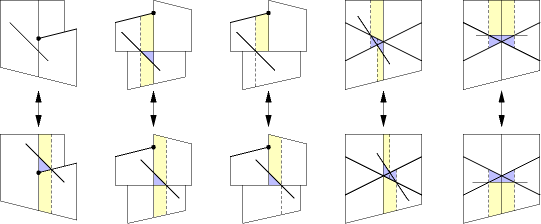[Some essential details in the figures were lost in the actual printed proceedings.]
[This is a lowresolution scan of the hardcopy proceedings paper. Even more crucial details in the figures have been lost.]
Abstract:
We describe randomized algorithms for efficiently maintaining a binary space partition of continuously moving, possibly intersecting, line segments in the plane, and of continuously moving but disjoint triangles in space. Our two-dimensional BSP has expected depth O(log n) and size O(n log n + k) and can be constructed in expected O(n log2 n + k log n) time, where k is the number of intersecting pairs. We can detect combinatorial changes to our BSP caused by the motion of the segments, and we can update our BSP in expected O(log n) time per change. Our three-dimensional BSP has depth O(log n), size O(n log2 n + k'), construction time O(n log3 n + k' log n), and update time O(log2 n) (all expected), where k' is the number of intersections between pairs of edges in the xy-projection of the triangles. Under reasonable assumptions about the motion of the segments or triangles, the expected number of number of combinatorial changes to either BSP is O(mn lambdas(n)), where m is the number of moving objects and lambdas(n) is the maximum length of an (n,s) Davenport-Schinzel sequence for some constant s.

 Publications -
Jeff Erickson
(jeffe@cs.duke.edu)
14 Feb 2002
Publications -
Jeff Erickson
(jeffe@cs.duke.edu)
14 Feb 2002